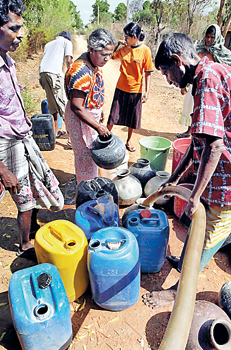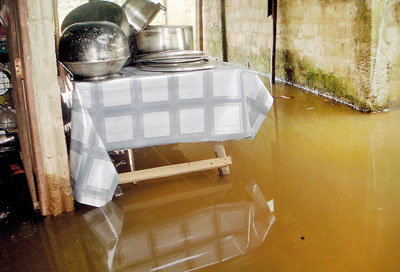No more green and lush, only brown and parched
Not a drop of water to drink, cook or bathe with. This was the plight of villagers of ten villages clustered by the banks of the Siyambalangamuwa tank in the Galgamuwa area last week, severely affected by the prevailing drought. The once lush green countryside and scenic tanks are brown and parched. The wells have run dry.
Water left in the few wells that are not completely dry is not fit for human consumption. “This is the worst drought we have had since the 1970s,” said Krishantha, coordinator for the Methwela Foundation, a non-profit private organisation working in the area.

Villagers line up to fill up cans and clay pots as the bowser comes
When the Sunday Times visited Galgamuwa, villagers, mainly women were gathered around a water bowser with pots, buckets and every available container to collect water. The water would have to last them for the day. After the containers are filled any balance water would be pumped into plastic water tanks placed at convenient spots around the villages. A bowser load of water finishes in 10 to 15 minutes and the Pradeshiya Sabha sends a bowser every two days or so during the weekdays. The Methwela Foundation supplements the supply of water on days the other bowser is not sent. The tanks have been provided by the state and other organisations, as well as Methwela Foundation through their donors.
Among the villages around the Siyambalangamuwa tank are Paardipanchawa, Diyawara, Lassanagama, Parasankulama, Siyambalangamuwa, Siyambalawe, Liyanagama, Jayalanda andAndarabedda, inhabited by a community of gypsies who fled Vavuniya during the war. The villagers depend on chena cultivation and fishing in the nearby tanks for their livelihood. Some villagers work as daily labourers by cultivating. Now without rain and the tanks being dry, they are in a bad way.
To add to their woes, the villagers are faced with the danger from wild elephants, desperate for food and water. Recently, they had their first casualty from an elephant attack. Krishantha himself was chased by an elephant and just escaped by running up an incline, injuring his back in the process.
At Andarabedda, we meet Rengasamy Massanna, the gypsy clan leader and Arachchi of the village.“We came here in August 1985, due to the war,” he recalled. “We came with nothing except our children and our coupon books.” After spending a week in a refugee camp and eight years in the gypsy village of Tambuttegama, the 40 families were relocated in Andarabedda, where the state built small permanent houses for them and installed several tube wells. Now the community of 174 people are settled in Andarabedda. Two toilets have been built for them by Methwela Foundation. “We are grateful to the state for this,” Massanna said. “We were given seeds but we cannot cultivate without water.
Having no other income they still engage in their traditional pursuits of monkey performances, snake charming and palm reading to make a living. “Our problem is water,” Massanna said. “We have no water to drink or bathe. If we at least had a well, we could manage. We got together and dug a well of about 18 feet and reached water. This water was used for cultivation. Unfortunately, the sides fell in and now the well has to be dug all over again. Having no lights, we are afraid to step out at night because of the elephants.” Massanna says the most help they receive is through Krishantha, who coordinates with the government authorities.
Krishantha who is himself from the nearby village of Diyawara, having graduated from Kelaniya university came back to help the villagers. He met Massanna through a research project while at university. With the aim of integrating this isolated community with the rest of the villagers, Krishantha together with the youth of the surrounding villages, formed the Andarabedda Youth Organisation and launched a programme to educate the children and also introduce them to the basics of hygiene, hoping it would rub off on the elders. “Now most of our children go to school,” Massanna said.
KaluArchchi, a villager of Andarabedda was setting out to have a bath at the Mahagalgamuwa tank five miles away. When she returned it would be evening. The area around the tank is also frequented by elephants in search of water. Returning after a bath in the murky green waters of Siyambalamgamuwa, a villager and her young son, who came from Usgalasiyambalangamuwa, said they have no other place to go for a bath. “We have not been able to cultivate for two seasons,” she said. “With the extended drought, food is scarce as well as water and I don’t know how the villagers manage to survive,” Krishantha commented.
Siyambalangamuwa tank, built by King Mahasen in 206 AD., has an area of 71 sq. miles and is usually full, the villagers say. Now there is only a small pool of green and brackish water in the centre, which is unsuitable for use. Even the elephants shun this water. Repairs are being carried out by contractors engaged by the Irrigation Department but work seems to be rather slow.
As we were returning from Galgamuwa, there was a brief ten minute shower of rain. Overjoyed villagers ran out to savour the first drops of rain after over five months. However their joy was short-lived as the rain was not sufficient to wet the parched ground. A half-hour shower two days later brought in a little water to the tanks but was still not sufficient for use as it was only wet mud. With the rains reported in Minneriya, Polonnaruwa and other nearby places the poor villagers of Galgamuwa, gaze hopefully at the sky for the rain clouds.
A school for eager young minds
The Methkekulu Pre-School caters to the poorest children in the villages around Siyambalangamuwa in Galgamuwa. Forty children from Paardipanchawa, a village of chena cultivators and Andarabedda, a village of Telegu-speaking gypsy community now enjoy the facilties made available to them.
Methkekulu was established in January 2008 by Methwela Foundation, in Paardipanchawa. Two dedicated trained teachers conduct the classes for the children from impoverished families, located in remote villages, who have been deprived of an education.
The school was opened in an abandoned pre-school building released by the state. A shramadana was conducted to repair and clean up the premises with parents enthusiastically joining in.
At the beginning of the year each child is given three uniforms. As the majority of children are malnourished and most of them come to school on an empty stomach, the school provides a cup of milk and biscuits in the morning and a nourishing meal of Samaposha twice a week. The children are also provided school books.
The children from the gypsy community of Andarabedda are now integrated with the other children and join in the activities. During the year, various events such as a SingithiPola, Sinhala and Tamil New Year celebrations etc are held and their yearend concert is a welcome social gathering for the villagers. An annual trip to Colombo for their first sight of the sea and a visit to the zoo are greatly enjoyed by the children as well as the parents.
Follow @timesonlinelk
comments powered by Disqus


























